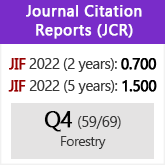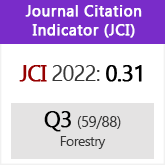Wild olive and holm oak response to a fulvic amendment application on soils polluted by trace elements
Abstract
The effect of the application of a fulvic acids-rich amendment on the growth and nutrition of two representative species of the Mediterranean forest, wild olive (Olea europaea L. var. sylvestrys Brot.) and holm oak (Quercus ilex, L. subsep. ballota) was studied. Both species were used frequently in the afforestations of the «green corridor» in the Guadiamar Valley, as part of the ecological restoration of the soils affected by the Aznalcóllar mine spill. Fulvic acids are known to increase the availability of the minor elements; however, phytotoxic effects could derive if the mobilization of trace elements potentially toxic are excessive. The application of the amendment in soils of the corridor highly polluted by trace elements, increased only slightly the concentrations of Cu, Zn, As, Cd, Pb and Tl in the leaves of both species. The main nutrient contents were basically not affected (significant increases in N were recorded for the wild olive) and increases in chlorophyll were recorded for both species. Interestingly, the growth of the wild olives treated with the amendment was better in the affected soils than in an unaffected soil used for comparison. The results seem to corroborate the absence of phytotoxicity that could derive from the amendment application on soils polluted by trace elementsDownloads
© CSIC. Manuscripts published in both the printed and online versions of this Journal are the property of Consejo Superior de Investigaciones Científicas, and quoting this source is a requirement for any partial or full reproduction.
All contents of this electronic edition, except where otherwise noted, are distributed under a “Creative Commons Attribution 4.0 International” (CC BY 4.0) License. You may read here the basic information and the legal text of the license. The indication of the CC BY 4.0 License must be expressly stated in this way when necessary.
Self-archiving in repositories, personal webpages or similar, of any version other than the published by the Editor, is not allowed.















